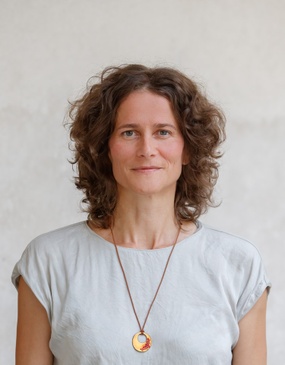Cornelia Auer serves as the Head of the Secretariat for the Scientific Climate Advisory Board (WKB) of Brandenburg. With an academic background in climate science and her policy experience, Cornelia Auer supports the development of evidence-based climate strategies. Cornelia Auer coordinates the activities of the WKB, contributes to research agendas, and helps crafting recommendations that inform Brandenburg's climate policies.
As a liaison between science, politics, and society, Cornelia Auer facilitates collaboration and ensures that scientific insights are considered in decision-making processes. Through public outreach and stakeholder engagement, Cornelia Auer promotes dialogue on climate issues. With a focus on sustainability, Cornelia Auer works to integrate scientific research into climate action.
Teaching: Humboldt University Berlin Climate and Energy Management - Lecture & Seminar
Contributing author to the IPCC AR6 Annex III.
Advisory functions:
Spokesperson for the climate council of Berlin's Senate
Advisor to a Berlin citizen initiative for a citizen assembly and Berlin climate law referendum.
Department
Contact
14412 Potsdam
IPCC, 2022: Annex III: Scenarios and modelling methods [Guivarch, C., E. Kriegler, J. Portugal-Pereira, et al. ]. In IPCC, 2022: Climate Change 2022: Mitigation of Climate Change. Contribution of Working Group III to the Sixth Assessment Report of the Intergovernmental Panel on Climate Change [P.R. Shukla, J. Skea, R. Slade, A. Al Khourdajie, et al.]. Cambridge University Press, Cambridge, UK and New York, NY, USA. doi: 10.1017/9781009157926.022
Report: Deutschland auf dem Weg zur Klimaneutralität 2045 - Szenarien und Pfade im Modellvergleich | Ariadne.
Máñez Costa, M. et al. Co-production of Climate Services : A diversity of approaches and good practice from the ERA4CS projects (2017–2021). (2022) doi:10.3384/9789179291990.
Auer, C., Kriegler, E., Carlsen, H., Kok, K., Pedde, S., Krey, V., and Müller, B. (2021). Climate change scenario services: From science to facilitating action. One Earth 4, 1074–1082.
Auer, C., & Kowarsch, M. (2020). Energiewende und Strom. Potsdam: Kopernikus-Projekt Ariadne, Potsdam-Institut für Klimafolgenforschung.
Auer, C., & Kowarsch, M. (2020). Verkehrswende. Potsdam: Kopernikus-Projekt Ariadne, Potsdam-Institut für Klimafolgenforschung.
Otto, I.M., Wiedermann, M., Cremades, R., Auer, C., Donges, J., Lucht, W. (2020) Human agency in the Anthropocene. Ecological Economics,106463
Automatic, Tensor-Guided Illustrative Vector Field Visualization C.Auer, J.Kasten, A.Kratz, E.Zhang, I.Hotz in Proc. IEEE Pacific Visualization Symposium 2013, pp. 265-275, 2013
Visualization and Analysis of Second-Order Tensors: Moving Beyond the Symmetric Positive-Definite Case A.Kratz, C.Auer, M.Stommel, I.Hotz in journal Computer Graphics Forum - State of the Art Reports, Vol.1, pp. 49-74, 2013.
Glyph- and Texture-Based Visualization of Segmented Tensor Fields C. Auer, C. Stripf, A. Kratz, I. Hotz. SciTePress Digital Library, 2012 in proc. International Conference on Information Visualization Theory and Applications (GRAPP/IVAPP’12).
Tensor Invariants and Glyph Design A.Kratz, C.Auer, I.Hotz in book: Visualization and Processing of Tensors and Higher Order Descriptors for Multi-Valued Data, pp.17-34
Complete Tensor Field Topology on 2D Triangulated Manifolds embedded in 3D C.Auer, I.Hotz in journal Computer Graphics Forum (EuroVis’11), 2011, 30, p. 831-840
2D Tensor Field Segmentation C.Auer, J.Sreevalsan-Nair, V.Zobel, I.Hotz in Scientific Visualization: Interactions, Features, and Metaphors, Schloss Dagstuhl-Leibniz-Zentrum fur Informatik 2011, vol 2, 17-35.
Eigenvector-Based Interpolation and Segmentation of Symmetric 2D Tensor Fields J.Sreevalsan-Nair, C.Auer, B.Hamann, and I.Hotz in Topology Book 2009, Springer.
Senses Project - SENSES Toolkit
Ariadne Project
Cascades Project
CCVI Preview Project
NGFS Scenarios (Jan. 2020 - ) with IIASA, Uni. of Maryland, Climate Analytics and ETH Zürich
Finscapes Project
Cornelia Auer (co-)lead the scientific analysis, communication and visualization the following projects
The Preview CCVI project - in cooperation with the Federal Foreign Office and the University of the Bundeswehr Munich: development of a Climate—Conflict—Vulnerability Index (CCVI), which maps current global risks by integrating climate and conflict hazards with local vulnerabilities. The index comprises a harmonized set of data layers and a transparent scoring methodology to make regions globally comparable. The data is updated quarterly and gridded to 0.5 degrees (ca. 55km by 55km at the equator).
The SENSES project - developing a climate change scenario service to provide access to a broader community of key decision makers to climate change scenarios. Scenarios cover the spectrum from global to regional and also include climate change (CMIP) - and impact- projections (ISIMIP). The SENSES project is also coordinated by her.
Kopernikus ARIADNE project about the German way to climate neutrality - supporting a common learning across the consortium, policy makers, businesses and the general public. The communication is not only a pillar in supporting the parties to be able to speak with one voice about options, consequences, and gaps in transition pathways, but also to provide external users a novel access to scenario data.
The NGFS portal - a follow up project from the SENSES project. Making scenario based risk assessment accessible to users from the financial sector, e.g. a global network of central banks (NGFS).
Link to portal: https://www.ngfs.net/ngfs-scenarios-portal/






